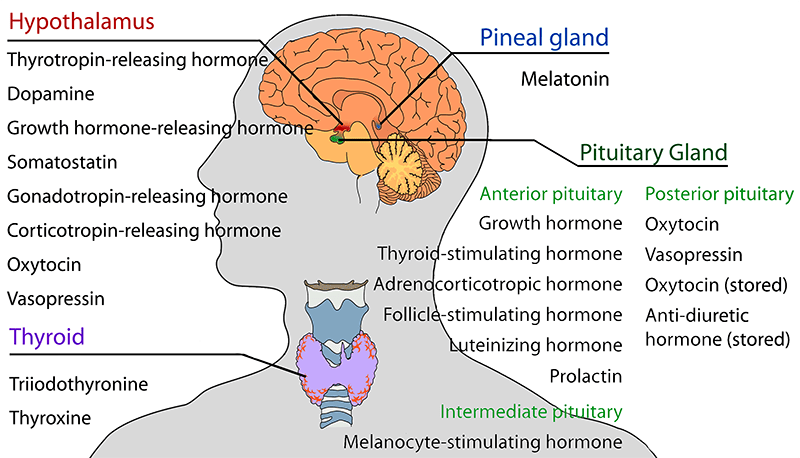Endocrinology: The Endocrine System and our Health
What is Endocrinology?
Endocrinology is the study of the body’s endocrine system. Endocrinology focuses on hormones and the glands and tissues that make them.
Hormones act as messengers directing various functions throughout the body. They control metabolism, respiration, growth and development, reproduction, sensory perception and more. Hormones also regulate emotions, behavior and mood.
When hormones are out of balance, a wide range of symptoms and health conditions can result. This can affect both men and women.
A hormone imbalance can be caused by a medical condition. External factors can also impact hormone levels. These factors include: stress, infection, lack of sleep, diet, chemicals, and medication.
Endocrine System and Functions
Hypothalamus:
The hypothalamus plays a significant role in the endocrine system. Located in the brain, it connects the endocrine system and the nervous system. Maintains the body’s internal balance, known as homeostasis. It sends messages to the pituitary gland to stimulate or inhibit hormone production.
Pituitary:
A small organ located at the base of the brain. Receives messages from the hypothalamus that control certain body functions. Stimulates other glands to produce hormones.
Pineal:
A small, pea-shaped gland in the brain. Produces and regulates some hormones, including melatonin.
Thyroid:
A butterfly-shaped gland in the neck. Regulates metabolism, which is your body’s ability to break down food and convert it to energy.
Parathyroid:
Small glands behind your thyroid important to bone health. They controls calcium and phosphorus levels in the body.
Thymus:
This gland makes white blood cells called T-lymphocytes. Important for fighting infection and are crucial as a child’s immune system develops.
Adrenal:
Located above the kidneys. Produces adrenaline (fight or flight hormone), and the steroids aldosterone and cortisol.
Pancreas:
Part of both digestive and endocrine systems. Produces insulin and glucagon, regulating blood glucose. Also produces enzymes to aid in digestion.
Reproductive glands:
Ovaries in women, testes in men. Produce hormones estrogen, progesterone, and testosterone.
Symptoms of Endocrine Disorders
There is a wide range of symptoms which vary depending on the specific gland involved. Most often, people with an endocrine system disorder complain of fatigue and weakness. Other symptoms include digestive issues, dehydration, dry skin/skin changes, issues with growth, weight loss/weight gain, rapid heart rate, sweating, anxiety/nervousness and depression.
If you experience symptoms related to the endocrine system, your doctor will likely refer you to an endocrinologist.
What is an Endocrinologist?
An endocrinologist is a medical doctor who specializes in endocrine system disorders. Endocrinologists diagnose and treat conditions related to the endocrine system and hormone imbalances. An endocrinologist can best provide treatment options to restore normal hormonal balance.
Common Endocrine Disorders:
- Adrenal disorders
- Osteoporosis and bone health
- Diabetes
- Endocrine disorders in children (lack of growth, problems with puberty)
- Cardiac issues (high cholesterol, triglycerides, high blood pressure)
- Women’s/Men’s health and reproductive problems
- Pituitary disorders
- Thyroid disorders
- Weight and metabolism.
Traumatic Brain Injury (TBI) and the Endocrine System
The pituitary gland and hypothalamus are the “command center” of the endocrine system. Located in and near the brain, they are vulnerable and most often affected by brain injury.
Trauma to the brain can disrupt normal hormone production. This can lead to several conditions, including:
- Growth hormone deficiency: Can cause anxiety, depression, baldness (in men), decreased muscle mass and strength, dry skin, and fatigue
- Hyponatremia (very low levels of sodium in the blood): Symptoms include nausea, vomiting, headaches, confusion, fatigue, irritability, muscle weakness, spasms or cramps
- Hyperprolactinemia (very high levels of prolactin in the blood)
- Hyperthermia (elevated body temperature due to failed thermoregulation)
- Adrenal insufficiency (adrenal glands do not produce enough steroid hormones, primarily cortisol): Symptoms include hypoglycemia, weight loss, dehydration, confusion
- Diabetes insipidus: Symptoms include increased thirst and increased amount of diluted urine. Can lead to dehydration or seizures
- Hypothyroidism (thyroid gland does not produce enough thyroid hormone): Symptoms include fatigue, constipation, depression, and weight gain
- Hypogonadism (reduction or absence of hormone secretion of the sex glands).
These conditions can arise soon after the TBI occurs or sometimes months or years later.
Are you experiencing symptoms of an endocrine disorder, such as Fatigue, Anxiety, Mood Changes, Irritability, Sleep Problems?
Most everyone will experience a period of hormonal imbalance during their life. Some people experience continual, irregular hormonal imbalances. These cases should be treated by an endocrinologist.
Dr. Kathleen O’Neil-Smith, MD, Endocrinologist, FAARM is a member of Dr. Diane®‘s integrative team of brain health experts.
Using Dr. Diane’s 5 Prong Approach, we provide customized treatment programs helping patients achieve optimal health.
Whether your endocrine disorder is a result of a brain injury, environmental issues or genetics, we can help you overcome your symptoms. There is a Way!®



